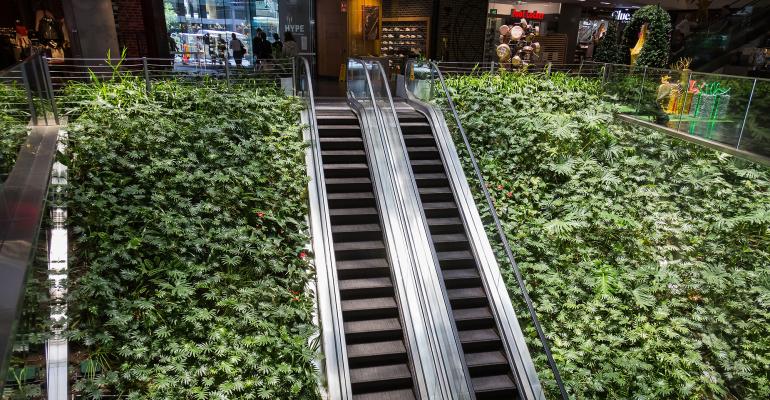When considering the retail real estate industry—where top-performing properties are consistently evolving to provide engaging new experiences—sustainability may not be the first attribute that comes to mind. But in fact, corporate responsibility should underpin our approach toward the people, places and communities where retail centers operate, both in the built environment and as we are designing places for the future.
Taking into consideration both building and operational impacts, the real estate industry contributes 40 percent of global greenhouse gas emissions. The good news is that our industry is also best positioned to make meaningful changes that increase the long-term value of the built and enhance the natural environments that make up our properties.
For the real estate sector to embrace these responsibilities, we must do more than swap lightbulbs with LEDs. Genuine sustainability and corporate responsibility involve many intertwined influences, including protecting natural resources, ensuring our spaces are welcoming gathering places for everyone, and guiding employment practices.
The trend that powers the future—sustainably
Corporate responsibility requires meaningful action, far beyond words or gestures. People and communities share these beliefs and increasingly choose to purchase from brands and at venues that align with their values.
This trend is all the more significant as younger generations come into adulthood and increase their purchasing power. According to a recent Bloomberg report, Gen Z—people born from 1997 to 2012—commands $360 billion in disposable income. These millions of young adults deeply value social responsibility, from demonstrating inclusive hiring practices to having a real stake in environmental protection—and will base purchasing and employment decisions on those priorities.
Sustainability isn’t a fad; it’s a movement. At my company, Macerich, we’ve focused on sustainability and corporate social responsibility for more than 23 years, since before many of today’s most common sustainability guidelines were even imagined. Now, we are on track toward our goal of achieving carbon neutrality by 2030, two decades ahead of the climate accords defined by the 2015 Paris Agreement. Beyond our emissions goals, we also have an ongoing commitment to reduce the amount of waste in landfills and ensure responsible water usage.
Measuring change to manage change
To accelerate a commitment to meaningful change, companies will want to consider a fully integrated, forward-thinking environmental, social, governance (ESG) approach. For environmental change, that may mean seeking validation of Science Based Targets initiative (SBTi) commitments to reduce emissions in line with a goal of halting global temperature rise at 1.5°C, or achieving BREEAM or LEED certification of sustainable practices from design through construction and operation.
As Macerich continues to lead in sustainability performance, we are equally committed to furthering constructive social change. Our company is sharply focused on our opportunity to champion industry-wide change by embracing inclusion and embedding DEI practices in the way we do business. Across the retail real estate industry, this work includes creating positive experiences and impacts for people and communities. It starts by welcoming all people, whether as part of a vibrant workplace culture or to enjoy our properties. For example, in 2021 alone Macerich properties hosted more than 1,800 events supporting local causes and communities, such as blood drives, farmers markets, COVID testing sites, food drives, cultural celebrations and more.
While often the most challenging, sound corporate governance must also be addressed. This could include policies committed to sound ethical practices, including those that embrace diversity, equity and inclusion, assigning responsibility for achieving ESG goals to the highest levels of governance, and using financial metrics to tie executive compensation to achieving ESG goals.
Shopping centers are physical places at the heart of their communities. They are where people come together not only to shop but to eat, play, stay, live, work, discover and explore. Retail real estate connects and inspires people while also providing valuable hubs for economic activity and job creation. These sites are today’s civic centers—nonreligious, nonpolitical places for people to see neighbors and do good in their communities.
That means real estate owners and developers have a responsibility to preserve and promote these centers by keeping them sustainable now and for future generations.
Olivia Bartel Leigh is Executive Vice President, Portfolio Operations and People, for Macerich, a leading owner, operator and developer of high-quality retail real estate in densely populated and attractive U.S. markets. She leads Macerich’s Environmental, Social and Governance (ESG) efforts, which have earned the #1 GRESB ranking in the North American Retail Sector for seven straight years (2015-2021) and CDP Climate “A List” status for many years running. View the new Macerich Corporate Responsibility Report at https://investing.macerich.com/corporate-responsibility/sustainability.




